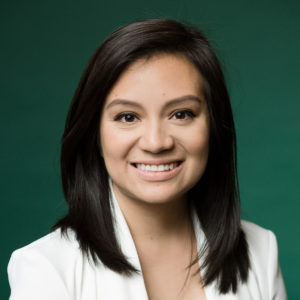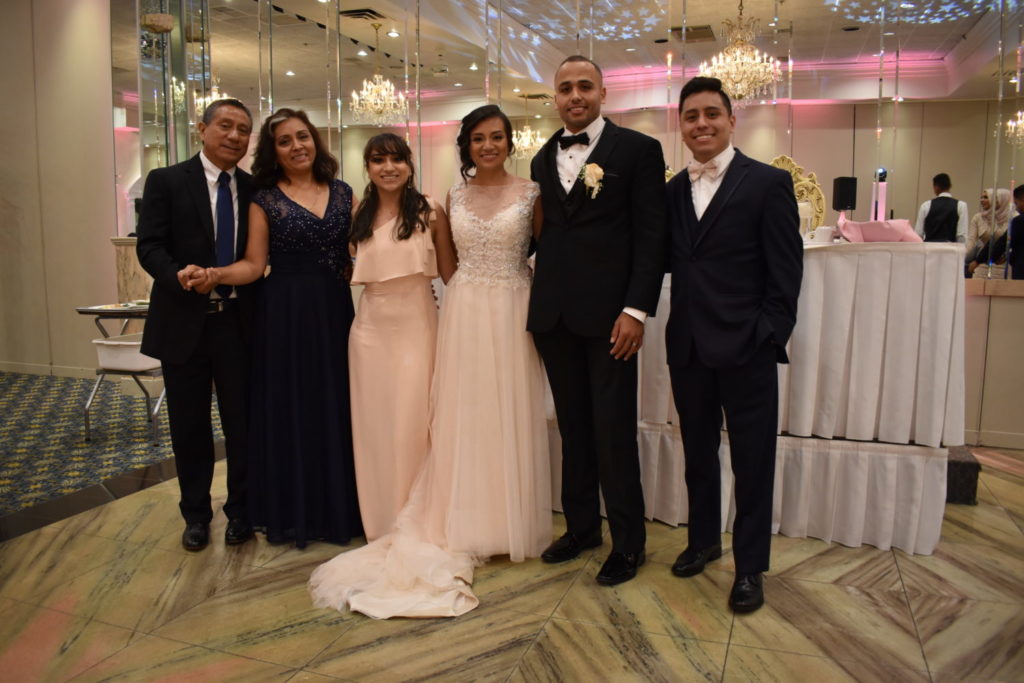How the emerging leader at Guerrero Media found her place in the world—personally and professionally

Cristina Ali, Content and Advertising Manager for Hispanic Executive
When she was 17, Cristina Ali was looking forward to her high school graduation and planning for a future in medicine. Until then, she had considered herself a typical American teenager, and hadn’t thought much about her family’s origins in Guatemala—after all, her parents moved to the United States when she was 18 months old, so her earliest childhood memory was of their life in Indiana. When her father sat her down and explained that not only could the family not afford to send her to a pre-med college program, she also wouldn’t qualify for financial aid, Ali was full of questions. “Why not me?” she asked. “I’ve gotten the same education as my friends, but they can get scholarships and not me. Why?”
Thus began the period of her life that would redefine her.
———-
Twenty-five years ago, Ali’s father was awarded a Fulbright scholarship to complete a master’s degree program at Ball State University. He moved from his home in Guatemala to the University’s campus in Indiana, where his wife, 18-month-old daughter (Cristina), and infant son would soon join him. Their whole life packed into one suitcase, the family created a home at a university dormitory, building a community around Ball State’s international student activities.
At age eight, Ali moved to the south suburbs of Chicago, where her father started a job with the University of Illinois. What she didn’t know at the time was that he was facing concerns with the stipulation of his Fulbright scholarship: at the end of the program, the scholar needs to go back to his or her country of origin for at least two years. He and his wife wanted to stay in the United States to give their three children—Ali’s sister was born while they lived in Indiana—a more competitive education. He applied for a waiver of the two-year requirement, and the University of Illinois sponsored a working visa that kept the family stateside. None the wiser, Ali and her siblings continued their Midwestern upbringing, and it wasn’t until she was 17 that she learned about her immigration status.
Frustrated by her newfound challenges with attending college, Ali brainstormed solutions with her parents. “My dad’s idea was that I could get an education outside of the United States, so the plan was to send me to the University of Barcelona,” she recalls. This path required additional testing for Ali, which meant that she was simultaneously studying for her high school final exams and for entrance exams into Spain’s educational system. “The day I graduated, I took a Spanish exam in New York, came back to Chicago, walked the stage, and didn’t know where I was going in the fall,” she says, hinting at her envy of friends who had already secured their college plans.
Unfortunately, Ali’s plans to go to Barcelona didn’t work out, and her best remaining option was to attend college in Guatemala where her parents had earned their bachelor’s degrees. Her mother was concerned about a culture shock for Ali moving from Chicago to Guatemala. “My mom was like, ‘I have to go with her,’” she says. That summer, the two embarked on a journey back to the home Ali never knew.
“I got the opportunity to live in the shoes of my people.”
“You learn right away that Guatemalans have a different lifestyle—the security people have in the U.S. is not the same in Guatemala,” Ali says. For 36 years, Guatemala endured a civil war, ending in a peace accord in 1996. Ali’s parents left Guatemala in 1993, during the war, and when she and her mother returned in 2010, the country still faced troubles with corrupt law enforcement and organized crime groups.
Despite general security concerns, Ali felt safe in the company of the family—cousins, grandparents, aunts, and uncles—that she got a chance to meet for the first time. “I got the opportunity to live in the shoes of my people,” she says, adding that, though this was the country of her citizenship, she stood out as a foreigner because of her clothes, her accent, and her struggles with fluency in the language.
Ali lived in Guatemala for five months, and adapting to life in the new country proved a more impactful lesson than schooling could have provided. “I realized how fortunate I was to live in the United States,” she says. Soon after arriving, she and her mother began planning their return home, but the process took longer than expected due to visa restrictions.
Her father petitioned for his wife and daughter’s return home, and, at the same time, was offered a new position at the University of Connecticut. Ali and her mother were granted passage, and her father tried to convince her to attend UConn, as her tuition would be paid for by the school as a benefit of his employment. But Ali just wanted to go home—the only home she ever knew, in Chicago. She enrolled in community college at Prairie State University, where she would earn her associate’s degree before moving to Connecticut with her father to earn her bachelor’s at UConn.
Her new field of study? Social psychology. “The level of poverty in Guatemala left kids suffering from starvation due to lack of job opportunities,” she recalls, “but nonetheless, the people were so happy. Despite the lack of opportunities, everyone was so humble and willing to help others.” This inspired a new focus for her studies.
“The goal is to give a voice to immigrants.”
Though she was glad to be living in the States, the cloud of her immigration status always hung over her head. “I couldn’t start a career, because my student visa didn’t allow it,” she explains. “I couldn’t work more than 20 hours a week, and I could only work on campus. To stay in this country, my only option was to continue my studies.”
Ali went on to earn her master’s degree from DePaul University with a dual focus in organization and multicultural communications and a specialty in Latino media studies. “The goal is to give a voice to immigrants,” she says. After her experiences in Guatemala, she hopes to one day give back to the Latino community, as a way of paying it forward for the opportunities she was given by family, friends, and school faculty to advance despite her immigration status.
After earning her master’s degree, Ali had a choice to make: continue schooling in a PhD program, or return to Guatemala. Fatefully, a third option entered her life. She met her now-husband, who himself had immigrated to the United States from Egypt when he was 12 and knew exactly what she was going through. Now a citizen, he married Ali in August 2017.

Ali’s family celebrates her marriage in 2017. (L to R) German Cutz, Sandra Cutz, Leticia Cutz, Cristina Ali, Abdalla Ali, and German Cutz, Jr.
Though she still has some time to wait until she can apply for her green card and before she can travel freely, Ali is settling happily in her new married life and her career with Hispanic Executive magazine. “Working with Hispanic executives gives me hope that minorities can find a seat at the leadership table,” she says, adding that through hard work, faith, and determination, anything is possible.
“My story is not the typical immigrant story,” she says. “I didn’t face struggles coming to this country, rather I struggled to stay in the only home I knew. Guatemala is my place of birth and holds a special place in my heart, but the U.S. has always and will always be my home country. I have my parents to thank for all of the opportunities that have been presented to me, and I can only hope to further thrive in this country.”

